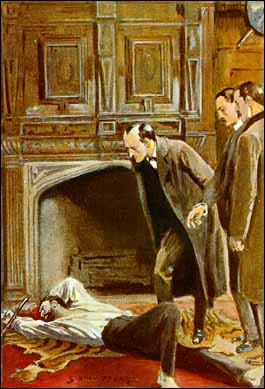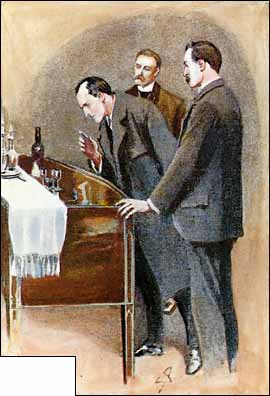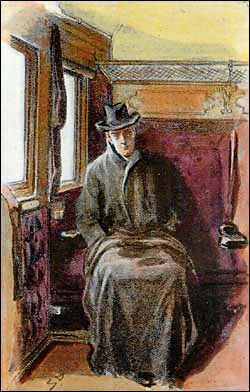It was a very large and high chamber, with carved oak ceiling, oaken panelling, and a fine array of deer’s heads and ancient weapons around the walls. At the further end from the door was the high French window of which we had heard. Three smaller windows on the right-hand side filled the apartment with cold winter sunshine. On the left was a large, deep fireplace, with a massive, overhanging oak mantelpiece. Beside the fireplace was a heavy oaken chair with arms and crossbars at the bottom. In and out through the open woodwork was woven a crimson cord, which was secured at each side to the crosspiece below. In releasing the lady, the cord had been slipped off her, but the knots with which it had been secured still remained. These details only struck our attention afterwards, for our thoughts were entirely absorbed by the terrible object which lay upon the tiger-skin hearthrug in front of the fire. | 非常に大きくて高い部屋だった / 天井は浮き彫りされた樫材 / オークの羽目板 / そして見事な鹿の頭と古い武器の列が / 壁をぐるりと取り囲んでいた◆扉の反対側の奥には / 我々が聞かされた背の高いフランス窓があった◆右側にあるこれより小さい三つの窓が / 部屋全体に冷たい冬の日差しを投げかけていた◆左側には / 大きな奥の深い暖炉があった / 量感あるひさしのように突き出たマントルピースのついた◆その暖炉の横に / 肘掛と下に横木がついた重い樫製の椅子があった◆そして椅子の開口部を出たり入ったりするように / 赤い紐が通っていた / それは両側で下の横木に括りつけられていた◆夫人を解放するとき / 体をすり抜けていた / しかし括りつけた結び目はまだ残っていた◆このような詳細は後で我々の注目を引いたに過ぎない / 我々の考えは完全に恐ろしい物体に奪われていたからだ / 暖炉の前の虎皮の敷物の上に横たわる |
 | |
It was the body of a tall, well-made man, about forty years of age. He lay upon his back, his face upturned, with his white teeth grinning through his short, black beard. His two clenched hands were raised above his head, and a heavy, blackthorn stick lay across them. His dark, handsome, aquiline features were convulsed into a spasm of vindictive hatred, which had set his dead face in a terribly fiendish expression. He had evidently been in his bed when the alarm had broken out, for he wore a foppish, embroidered nightshirt, and his bare feet projected from his trousers. His head was horribly injured, and the whole room bore witness to the savage ferocity of the blow which had struck him down. Beside him lay the heavy poker, bent into a curve by the concussion. Holmes examined both it and the indescribable wreck which it had wrought. | それは背が高い立派な体格の男の死体だった / 四十歳くらいの◆彼は仰向けに倒れ / 顔は天井を向いていた / 短い黒髭の中から白い歯が輝いていた◆握り締められた両手は頭の上に振り上げられ / そして重いサンザシ製の杖が体に交差するように置かれていた◆彼の黒い、均整の取れた、鋭い顔立ちは / 悪意に満ちた憎しみの発作へと歪んでいた / それが彼の死に顔を恐ろしい悪魔のような表情にしていた◆彼はベッドの中にいたようだった / 危険を察知した時 / 彼はしゃれた刺繍の入ったナイトシャツを着て / ズボンから裸足が突き出ていたからだ◆彼の頭は恐ろしく傷つけられていた / そして部屋中に痕跡が残っていた / 恐ろしい一撃が彼を打ちのめした時の◆彼の側に重い火掻き棒が落ちていた / その衝撃で折れ曲がった◆ホームズは両方を調べた / 火掻棒とそれが鍛造した恐ろしい残骸を |
“He must be a powerful man, this elder Randall,” he remarked. | 「この父親のランダルというのは腕力のある男に違いない」 / 彼は言った |
“Yes,” said Hopkins. “I have some record of the fellow, and he is a rough customer.” | 「ええ」 / ホプキンズが言った◆「この男の記録を持っています / 彼は荒くれ男です」 |
“You should have no difficulty in getting him.” | 「彼を捕まえるのに困難はほとんどないだろう」 |
“Not the slightest. We have been on the look-out for him, and there was some idea that he had got away to America. Now that we know that the gang are here, I don’t see how they can escape. We have the news at every seaport already, and a reward will be offered before evening. What beats me is how they could have done so mad a thing, knowing that the lady could describe them and that we could not fail to recognize the description.” | 「まったくありませんね◆警察は彼に目を光らせていました / しかし彼がアメリカに逃亡したという見解がありました◆今、一味がこの地にいることが分かりました / やつらがどうやって逃げられるか考えもつきません◆すでに全部の港から連絡が入っています / そして夜までに懸賞金がかけられる予定です◆私が理解できないのは / どうやって奴らがこんなに狂ったような事ができたかです / 知っていながら / 夫人が彼らの人相を供述することが出来て / 警察が必ず奴らの人相と分かるのに」 |
“Exactly. One would have expected that they would silence Lady Brackenstall as well.” | 「まさにそうだ◆奴らがブラックストール夫人も始末すると考えるのが普通だろう」 |
“They may not have realized,” I suggested, “that she had recovered from her faint.” | 「奴らは気付いていなかったのかもしれない」 / 私が示唆した / 「夫人が失神してから意識を取り戻していることを」 |
“That is likely enough. If she seemed to be senseless, they would not take her life. What about this poor fellow, Hopkins? I seem to have heard some queer stories about him.” | 「それは十分考えられる◆もし夫人が意識をなくしているように見えていたら / 奴らは夫人の命をとろうとはしなかっただろう◆この被害者に関してはどうだ / ホプキンズ? / 彼に関しては変な話を聞いたようだが」 |
“He was a good-hearted man when he was sober, but a perfect fiend when he was drunk, or rather when he was half drunk, for he seldom really went the whole way. The devil seemed to be in him at such times, and he was capable of anything. From what I hear, in spite of all his wealth and his title, he very nearly came our way once or twice. There was a scandal about his drenching a dog with petroleum and setting it on fire – her ladyship’s dog, to make the matter worse – and that was only hushed up with difficulty. Then he threw a decanter at that maid, Theresa Wright – there was trouble about that. On the whole, and between ourselves, it will be a brighter house without him. What are you looking at now?” | 「しらふの時は気のいい男でした / しかし酔った時は完全な中毒者でした / いやもっと正確に言えば半分酔った時です / 彼はほとんど飲みつぶれることがなかったからです◆そういう時は悪魔が彼にとりついているようでした / そして彼はどんなことでもやれました◆私が聞いたところによれば / この富と称号にもかかわらず / 彼は一、二度危うく我々のお世話になりかけました◆こんなスキャンダルがありました / 彼が犬に石油をかけて火をつけるという / / さらに悪いことに、それは夫人の犬でした / / そしてこれはやっとのことで揉み消せました◆それから彼はデカンタをメイドのテレサ・ライトに投げつけました / / これで揉め事になりました◆要するに / ここだけの話ですが / 彼がいないほうがこの家は明るくなるだろうということです◆今、何をご覧になっているのですか?」 |
Holmes was down on his knees, examining with great attention the knots upon the red cord with which the lady had been secured. Then he carefully scrutinized the broken and frayed end where it had snapped off when the burglar had dragged it down. | ホームズはひざまずいていた / 非常に注意して調べながら / 夫人が縛られていた赤い紐の結び目を◆それから彼は慎重に切れてほつれた紐の先を観察した / それはちぎられていた / 強盗が引っ張った時 |
“When this was pulled down, the bell in the kitchen must have rung loudly,” he remarked. | 「これが引っ張られた時 / 台所のベルは大きな音で鳴ったはずだ」 / 彼は言った |
“No one could hear it. The kitchen stands right at the back of the house.” | 「誰もその音は聞こえなかったでしょう◆台所は屋敷の一番後ろにあります」 |
“How did the burglar know no one would hear it? How dared he pull at a bell-rope in that reckless fashion?” | 「強盗が誰も聞かないとどうやって知ったんだ? / なぜこんなに向こう見ずな方法でベルの紐をわざわざ引っ張ったんだ?」 |
“Exactly, Mr. Holmes, exactly. You put the very question which I have asked myself again and again. There can be no doubt that this fellow must have known the house and its habits. He must have perfectly understood that the servants would all be in bed at that comparatively early hour, and that no one could possibly hear a bell ring in the kitchen. Therefore, he must have been in close league with one of the servants. Surely that is evident. But there are eight servants, and all of good character.” | 「そのとおりです / ホームズさん / そのとおりです◆あなたはまさに私が何度も何度も自分の中で疑問に思っていたことをおっしゃいました◆疑いようがありません / 男がこの家と生活習慣を知っていたに違いない事は◆彼は完全に知っていたに違いない / 使用人たちが全員比較的早い時刻に寝室に行くことを / そして誰も台所のベルが鳴るのを聞くことができないと◆したがって / 彼は使用人の一人を仲間に入れていたに違いない◆これは明らかです◆しかし、使用人は八人いますが / 皆良い人間です」 |
“Other things being equal,” said Holmes, “one would suspect the one at whose head the master threw a decanter. And yet that would involve treachery towards the mistress to whom this woman seems devoted. Well, well, the point is a minor one, and when you have Randall you will probably find no difficulty in securing his accomplice. The lady’s story certainly seems to be corroborated, if it needed corroboration, by every detail which we see before us.” He walked to the French window and threw it open. “There are no signs here, but the ground is iron hard, and one would not expect them. I see that these candles in the mantelpiece have been lighted.” | 「他のことが同じなら」 / ホームズは言った / 「主人にデカンタを投げつけられた人間が疑わしいかもしれない◆しかし / それは女主人に対する裏切りを含むことになるな / この女性が献身的に尽くしているらしい◆よし / よし / これはささいな点だ / そして君がランダルを捕まえれば / 彼の共犯者を調べるのは多分簡単だろう◆夫人の話も間違いなく裏付けられるようだ / もし裏づけが必要ならばだ / 我々が目の前にしているあらゆる詳細によって」 / 彼はフランス窓に歩み寄って押し開けた◆「足跡はないな / しかし地面は鉄のように堅い / これはつくはずもないな◆マントルピースの上のロウソクに火がつけられていたようだな」 |
“Yes, it was by their light, and that of the lady’s bedroom candle, that the burglars saw their way about.” | 「ええ / その明かりで / それは夫人の寝室のロウソクでしたが / 泥棒はあたりを見ることができました」 |
“And what did they take?” | 「それで何を持っていったんだ?」 |
“Well, they did not take much – only half a dozen articles of plate off the sideboard. Lady Brackenstall thinks that they were themselves so disturbed by the death of Sir Eustace that they did not ransack the house, as they would otherwise have done.” | 「ええ / あまり多くは持って行きませんでした / / 食器棚から6個の皿類を盗って行っただけです◆ブラッケンストール夫人は思っています / 彼らは非常に動転していたので / ユースタス卿の死で / 彼らは部屋を荒らさなかった / そうでなければやっていたようには」 |
“No doubt that is true, and yet they drank some wine, I understand.” | 「間違いなくそうでしょう / それでも彼らはワインを飲んだみたいだな」 |
“To steady their nerves.” | 「気を落ち着けるためでしょう」 |
“Exactly. These three glasses upon the sideboard have been untouched, I suppose?” | 「確かにそうだな◆このサイドボードの上の三つのグラスは触ってないな?」 |
“Yes, and the bottle stands as they left it.” | 「ええ / 瓶もやつらが残したままです」 |
 | |
“Let us look at it. Halloa, halloa! What is this?” | 「ちょっと見てみよう◆おや / おや! / これは何だ?」 |
The three glasses were grouped together, all of them tinged with wine, and one of them containing some dregs of beeswing. The bottle stood near them, two-thirds full, and beside it lay a long, deeply stained cork. Its appearance and the dust upon the bottle showed that it was no common vintage which the murderers had enjoyed. | 三つのグラスが集まって置かれていた / 全てワインの色が残っていた / そしてその一つに少しワインの滓が残っていた◆その近くに瓶が立っていた / 三分の二ほど入った / その横に濃く色がしみこんだ長いコルクが置いてあった◆その様子と瓶の埃は / 殺人者たちが飲んだのは普通の等級のワインではないことを示していた |
A change had come over Holmes’s manner. He had lost his listless expression, and again I saw an alert light of interest in his keen, deep-set eyes. He raised the cork and examined it minutely. | ホームズの態度に変化が起きた◆彼は気の抜けた態度をやめて / 再び私は彼の鋭い奥まった目に油断ない光が表れるのを見た◆彼はコルクを取り上げて詳細に調べた |
“How did they draw it?” he asked. | 「どうやってこれを抜いたんだ?」 / 彼は尋ねた |
Hopkins pointed to a half-opened drawer. In it lay some table linen and a large corkscrew. | ホプキンズは半分開いた引き出しを指差した◆その中にナプキンと大きなコルク抜きがあった |
“Did Lady Brackenstall say that screw was used?” | 「ブラッケンストール夫人はそのコルク抜きが使われたと言ったのか?」 |
“No, you remember that she was senseless at the moment when the bottle was opened.” | 「いいえ / 覚えているでしょう / 彼女は瓶が開けられたときに意識を失っていたことを」 |
“Quite so. As a matter of fact, that screw was not used. This bottle was opened by a pocket screw, probably contained in a knife, and not more than an inch and a half long. If you will examine the top of the cork, you will observe that the screw was driven in three times before the cork was extracted. It has never been transfixed. This long screw would have transfixed it and drawn it up with a single pull. When you catch this fellow, you will find that he has one of these multiplex knives in his possession.” | 「そうだな◆実際には / あのコルク抜きは使われなかった◆この瓶は携帯用のコルク抜きで抜かれた / 多分ナイフについているやつだ / そして1.5インチ以上の長さではない◆コルクの上の部分を調べれば / コルク抜きが三回ねじ込まれたところが見えるだろう / コルクが引き抜かれる前に◆それは全く突き抜けてはいない◆この長いコルク抜きなら / コルクを突き抜けて一度引っ張れば抜けただろう◆君がこの男を捕まえれば / 君は見つけるだろう / そのような複合ナイフを持っていることを」 |
“Excellent!” said Hopkins. | 「素晴らしい!」 / ホプキンズが言った |
“But these glasses do puzzle me, I confess. Lady Brackenstall actually saw the three men drinking, did she not?” | 「しかし、実はこのグラスが僕を本当に困惑させる◆ブラッケンストール夫人は実際に三人の男が飲んでいるのを見たんだね?」 |
“Yes; she was clear about that.” | 「ええ / その点に関しては、はっきりしています」 |
“Then there is an end of it. What more is to be said? And yet, you must admit, that the three glasses are very remarkable, Hopkins. What? You see nothing remarkable? Well, well, let it pass. Perhaps, when a man has special knowledge and special powers like my own, it rather encourages him to seek a complex explanation when a simpler one is at hand. Of course, it must be a mere chance about the glasses. Well, good-morning, Hopkins. I don’t see that I can be of any use to you, and you appear to have your case very clear. You will let me know when Randall is arrested, and any further developments which may occur. I trust that I shall soon have to congratulate you upon a successful conclusion. Come, Watson, I fancy that we may employ ourselves more profitably at home.” | 「では、それで決まりだな◆それ以上何を言うことがある? / それでも / 認めなければならない / この三つのグラスは非常に注目に値すると / ホプキンズ◆何? / 君は注目に値するものではないと思うのか? / よしよし / それでいいだろう◆おそらく / 僕のように特殊な知識と能力を持っている人間は / どちらかといえば複雑な説明を探しがちなのだろう / もっと単純な説明が手近にあるのに◆もちろん / グラスのことは単なる偶然に違いない◆じゃ、失礼するよ / ホプキンズ◆僕は君の役に立てるとは思わない / そして君はこの事件を非常にはっきりとつかんでいるようだ◆ランダルが逮捕されたら僕に知らせてくれ / そして何か新しい展開が起きたら◆僕は確信しているよ / 僕がすぐに君にお祝いを言わなければならないと / 上首尾の結果に関して◆行こう / ワトソン / 我々は自宅にいるほうがもっと有益に活動できると思う」 |
 | |
During our return journey, I could see by Holmes’s face that he was much puzzled by something which he had observed. Every now and then, by an effort, he would throw off the impression, and talk as if the matter were clear, but then his doubts would settle down upon him again, and his knitted brows and abstracted eyes would show that his thoughts had gone back once more to the great dining-room of the Abbey Grange, in which this midnight tragedy had been enacted. At last, by a sudden impulse, just as our train was crawling out of a suburban station, he sprang on to the platform and pulled me out after him. | 我々の帰途の間 / 私はホームズの顔つきで分かった / 彼が何か見たものによって戸惑っていることが◆時折 / 努力して / 彼は気持ちを振り払おうとした / そしてこの事件が明白だというように話をした / しかしその後、彼の疑惑が再び舞い降りて / しかめた眉とぼんやりした目が示した / 彼の考えがもう一度戻っていたことを / アビ屋敷の大きな食堂へと / この深夜の惨劇が起こった◆遂に / 突然の衝動で / ちょうど私達の列車が郊外の駅をゆっくりと発車し始めた時 / 彼はプラットホームに飛び降りて私をひっぱり下ろした |